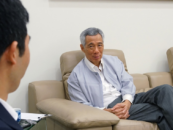
MAS: The Future of Money Is Too Important to Be Left Entirely to Central Bankers
by Fintech News Singapore July 13, 2021At the Andrew Crockett Memorial Lecture, Mark Carney spoke about ‘Decentralised Finance and the Future of Money.’ Carney provided an overview of the transformation taking place that will “re-wire” monetary and financial systems.
According to Carney, centrifugal forces are driving financial functions away from the traditional core and affecting all aspects of the monetary system. Moreover, amid this transformation, money has to be anchored on “values of trust, resilience, dynamism, solidarity and sustainability,” he said.
Agreeing with Carney, the Managing Director of the Monetary Authority of Singapore (MAS), Ravi Menon, shared insightful remarks on the subject. Menon focused on the decentralisation of finance across the three ‘I’s of the monetary stack — intermediaries, infrastructure and instruments. He also provided insights on how central banks and regulators can potentially guide this decentralisation to uphold the critical values of money highlighted by Carney.
Decentralisation of retail financial service delivery
According to Menon, the delivery of retail financial services is being decentralised in two major ways. Firstly, a broad range of non-traditional and often unregulated intermediaries are now offering retail financial products. This includes bigtech and fintechs that offer payments, lending, savings and investment services in addition to their core digital offering.
Secondly, regulated financial institutions are “embedding” their offerings on non-banking digital platforms to reach more consumers with lower acquisition costs.
Menon said that central banks and regulators should welcome both these developments with open arms as they can make financial services more efficient, affordable, and inclusive. However, as the number of third-party intermediaries involved in financial services grows, there might be increased operational risks, he warned.
To combat these emerging risks, regulators need to pay greater attention to market conduct, consumer protection and technology risks, Menon said. Moreover, regulatory frameworks need to become more modular and agile, focusing on entity-based regulation for key financial services like deposits, insurance and securities. At the same time, for the growing number of niche financial service providers, an activity-based regulatory approach needs to be adopted, Menon argued.
He added,
This is all still fairly familiar ground, as the fundamental structure of financial services remains largely intact. Intermediaries continue to be at the centre, even as distribution becomes more decentralised with diverse players and new ways of connecting with customers.
Decentralisation of financial infrastructure
Speaking about financial services infrastructure, Menon pointed out how technology offers significant ways of decentralising control. For instance, open crypto networks based on self-executing smart contracts and non-custodial financial services offer users control over their assets at all times and reduce both the cost and risk of finance, said Menon.
By decentralising key aspects of financial infrastructure such as access, data, and code, open crypto networks can also potentially enhance inclusion and innovation, he added. Direct access to financial infrastructure can increase competition while the availability of transaction data to all participants can increase contestability and transparency, he argued. Moreover, when the code is public, unlike proprietary code that runs on private servers, it can increase interoperability.
However, Menon said that such self-governing networks are far from meeting the high standards of governance, security, and resilience required of critical financial infrastructure. But nevertheless, central banks can incorporate these innovations in designing the next generation of payment infrastructure like central bank digital currencies (CBDCs).
Decentralisation of currency
The decentralisation of instruments, which forms the base of the monetary stack, is most clearly associated with emerging alternatives to fiat currencies, said Menon. Although crypto has largely failed to become money, the possibility of better algorithms leading to viable cryptocurrencies as global mediums of exchange in the future cannot be discounted, he added.
However, the rise of private cryptocurrencies can threaten a nation’s monetary sovereignty, said Menon. This in turn can affect a central bank’s ability to safeguard financial stability. And this could have a deeper impact on small, open economies that do not have the global network effects that currencies of larger economies enjoy.
Currency competition has always been prevalent in small economies that constantly strive to keep their currencies relevant in the domestic market to preserve monetary autonomy. But the benefits of an independent monetary policy have to be weighed against the efficiency gains from adopting a more widely circulated currency said Menon. Pegging to the US Dollar, the Euro or any other hegemonic currency is one thing; losing monetary sovereignty to a currency that is the liability of a private entity is another, he added.
Ultimately, in order for money to fulfil its function in the economy, it has to be trustworthy. Central banks, which have raked up credibility over time, are best suited to safeguard the trust that underpins sound money and safe payments. Moreover, this trust is not just about money being safe, said Menon, but also about a monetary system that is dynamic and purposeful.
Finally, the key question for the future of money is the appropriate division of labour between the public and private sector, said Menon. According to him, there is a continuum that spans from completely centralised systems with fiat currencies as the only mediums of exchange to completely decentralised systems with only private currencies in circulation.
At the end of the day, each country has to choose different positions along this continuum based on its cultural norms, social and institutional structures.
He concluded,
“As Stefan Ingves once told me, ultimately, it is not even a monetary question but a political one. For whatever we decide, it must have the ‘consent of the people’. The future of money is too important a matter to be left entirely to central bankers.”
Featured image credit: Photo by Jason Leung on Unsplash








